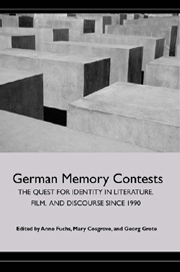Book contents
- Frontmatter
- Contents
- Acknowledgments
- Introduction: Germany's Memory Contests and the Management of the Past
- Positions
- 1 What Exactly Is Vergangenheitsbewältigung? Narrative and Its Insufficiency in Postwar Germany
- 2 The Tinderbox of Memory: Generation and Masculinity in Väterliteratur by Christoph Meckel, Uwe Timm, Ulla Hahn, and Dagmar Leupold
- 3 Telling It How It Wasn't: Familial Allegories of Wish-Fulfillment in Postunification Germany
- Mediations
- Ethnicity/Hybridity
- Memory Politics
- Works Cited
- Notes on the Editors and Contributors
- Index
1 - What Exactly Is Vergangenheitsbewältigung? Narrative and Its Insufficiency in Postwar Germany
from Positions
Published online by Cambridge University Press: 05 February 2013
- Frontmatter
- Contents
- Acknowledgments
- Introduction: Germany's Memory Contests and the Management of the Past
- Positions
- 1 What Exactly Is Vergangenheitsbewältigung? Narrative and Its Insufficiency in Postwar Germany
- 2 The Tinderbox of Memory: Generation and Masculinity in Väterliteratur by Christoph Meckel, Uwe Timm, Ulla Hahn, and Dagmar Leupold
- 3 Telling It How It Wasn't: Familial Allegories of Wish-Fulfillment in Postunification Germany
- Mediations
- Ethnicity/Hybridity
- Memory Politics
- Works Cited
- Notes on the Editors and Contributors
- Index
Summary
One year after Stalingrad, Victor Klemperer imagined how the war would be represented once it had ended. He transcribed into his diary the story of Horst-Siegfried Weigmann, whose death had been announced in the local paper on 19 January 1944, with a swastika inside the Iron Cross at the side of the notice. The announcement read: “Ordained by fate, my only dear son, student of chemistry, Lance Corporal Horst-Siegfried Weigmann, volunteer, holder of the Iron Cross, Second Class, participant in the Polish and French campaigns, was suddenly and unexpectedly taken from this life in the midst of his studies at only twenty-four years of age.” The death notice is signed “in deep sorrow” by his father, Bruno Weigmann, a musician from Munich. Klemperer continues in his diary to explain that some of Klemperer's friends knew the family and recalled that the mother was divorced from the father, and was Jewish. She had been among the Jews arrested in what Klemperer refers to as Dresden's “letzter Aktion” (last action). The son found out, posed as a Gestapo officer, and managed to speak to his mother in order to smuggle her out of prison and into hiding. Klemperer adds that there are said to be many Jews in hiding, particularly in Berlin. At the entrance of the prison, however, mother and son ran into a Gestapo officer who knew Weigmann and thus discovered the ruse. The mother was sent to Theresienstadt, and the son hanged himself in his prison cell.
- Type
- Chapter
- Information
- German Memory ContestsThe Quest for Identity in Literature, Film, and Discourse since 1990, pp. 25 - 40Publisher: Boydell & BrewerPrint publication year: 2006



